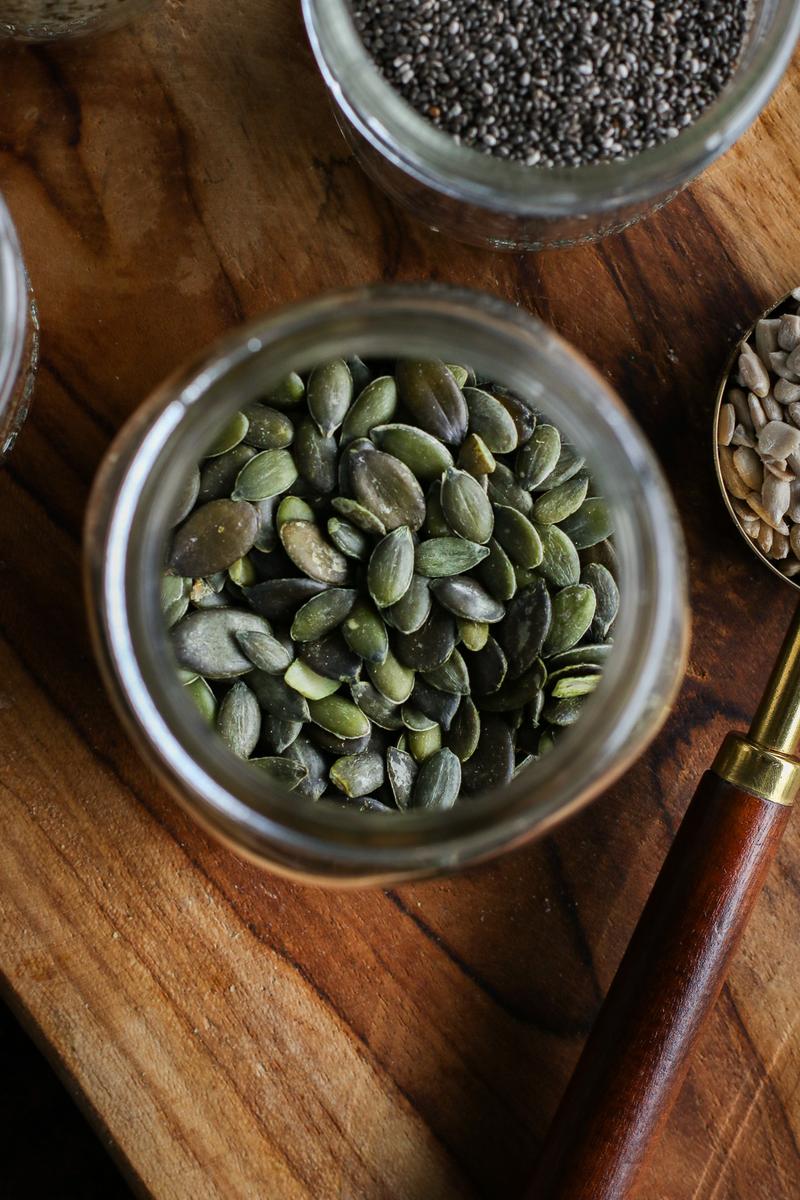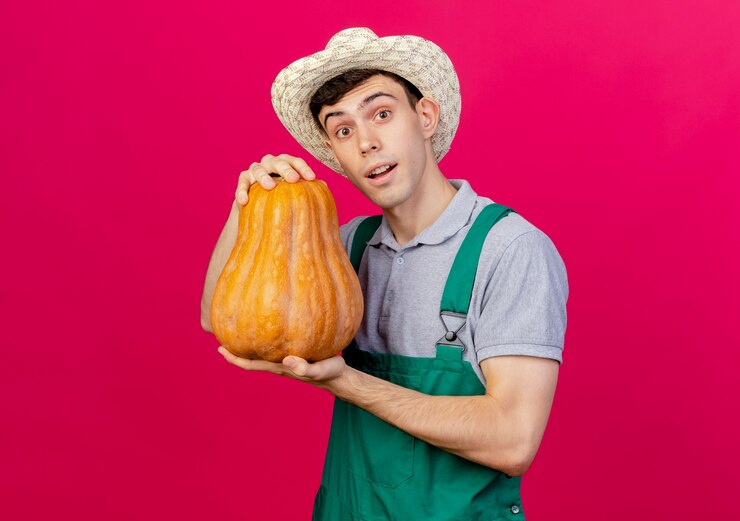WHY PUMPKIN SEEDS

Unlocking the Strength of Pumpkin Seeds: Your Health Guide
Nutrient snapshot:
Pumpkin seeds (approx. 28–30 g / 1 oz)
- Energy ~150 kcal | Protein ~7 g | Fat ~13–14 g (mostly mono- & polyunsaturated).
- Magnesium ≈150–180 mg (≈35–45% RDI per 30 g) — key mineral.
- Zinc ≈2–2.5 mg per 30 g (important for immunity & male reproductive health).
- Iron ≈2.5–4 mg per 30 g (plant non-heme iron).
- Tryptophan ≈160–180 mg per 30 g (precursor for serotonin/melatonin — sleep-relevant).
- Dietary fiber ≈1.5–2 g per 30 g (contributes to satiety & gut fermentation).
Benefits
1) Heart health
- Why: magnesium, unsaturated fats and phytosterols support normal blood-pressure regulation and favourable lipid handling; antioxidants reduce oxidative stress on vessels.
- Evidence: human trials and reviews with pumpkin seed oil and seed supplements show improved BP or HDL in some trials (not universal); animal models and mechanistic studies are supportive. Use conservative phrasing: “may help support normal blood pressure and healthy lipid profiles when consumed regularly as part of a balanced diet.”
2) Metabolic health / blood sugar control
- Mechanism: high magnesium + fiber + intact seed matrix slows carbohydrate absorption & improves insulin action. Magnesium intake is associated with lower risk of type-2 diabetes in large cohorts.
- Evidence: an acute human trial found adding ~65 g of pumpkin seed reduced postprandial glucose; cohort and meta-analyses link higher dietary magnesium to lower diabetes risk. Claim carefully: “may help support post-meal glycemic control and metabolic resilience.”
3) Men’s health — prostate / testosterone (BPH & reproductive support)
- Mechanism: pumpkin seed phytosterols and seed extracts may modulate factors linked to benign prostatic hyperplasia (BPH); zinc supports male reproductive physiology.
- Evidence: randomized pilot trials and longer placebo-controlled studies reported symptomatic improvement in men with lower urinary tract symptoms/BPH using pumpkin seed oil/extract (effects modest vs pharmaceuticals). Animal and small human studies suggest benefits for sperm parameters (mechanistic support via zinc, antioxidants). Phrasing: “may support urinary comfort and prostate health; contributes zinc to diets important for male reproductive health.”
4) Immunity
- Mechanism: zinc and other trace minerals (plus antioxidant nutrients) contribute to normal immune cell function. Zinc is essential for innate and adaptive immunity.
- Evidence: mechanistic and clinical nutrition literature identifies zinc as critical for immune competence. Label phrasing: “good source of zinc — contributes to normal immune function.”
5) Sleep (restorative sleep support)
- Mechanism: tryptophan → serotonin → melatonin pathway; magnesium also supports sleep physiology (muscle relaxation / GABA modulation).
- Evidence: dietary tryptophan and magnesium are associated with improved sleep metrics in reviews; foods are modest contributors compared with therapeutics. Phrasing: “may support healthy sleep when included in an evening snack or pattern of good sleep hygiene.”
6) Cognition (brain health & mood support)
- Mechanism: magnesium and zinc participate in neurotransmission, synaptic plasticity and protect against oxidative stress.
- Evidence: epidemiology & reviews link dietary magnesium and zinc status to cognitive outcomes — seeds are a practical dietary source. Phrasing: “contributes minerals that support normal cognitive function.”
7) Skin & hair health
- Mechanism: vitamin E precursors, essential fatty acids, zinc and phytosterols support cell membrane health and scalp physiology.
- Evidence: limited human RCTs exist for pumpkin seed oil and hair (one 24-week RCT showed increased hair count vs placebo) — promising but not definitive. Wording: “may help support hair density and skin health as part of a nutrient-rich diet.”

Optimal Consumption Guide
Daily Serving Recommendations
Note: Guidance is generic; individual needs vary. Follow pediatrician/physician advice for infants, pregnancy, medical conditions.
- 0–11 months: NOT RECOMMENDED, as whole seeds (choking risk). If introducing seed nutrients, use ground seed powder mixed into purees only after pediatric advice.
- 1–3 years: Avoid whole seeds. If using, provide finely ground (1–2 teaspoons/day) mixed into porridge/yogurt.
- 4–6 years: Small supervised portions: ½–1 tablespoon (≈5–10 g) crushed/ground or whole if child chews well.
- 7–12 years: 1–2 tablespoons (≈10–20 g) daily; whole seeds OK if chewing ability established.
- Adolescents (13–18): 15–30 g (≈1 tbsp–1 oz) daily depending on energy needs.
- Adults & older adults: 20–30 g (≈1 oz) daily is a practical target; older adults with dental issues may prefer ground seeds; monitor caloric balance.

How to Use Pumpkin Seeds
Versatile usage ideas:
- Roasted Snack: Season with sea salt and paprika
- Salad Topping: Add crunch to green salads
- Baking: Incorporate into breads and muffins
- Smoothies: Blend for protein boost
Disclaimer
This information is for educational purposes only. Consult a healthcare professional before making dietary changes. [Brand Name] makes no medical claims.




